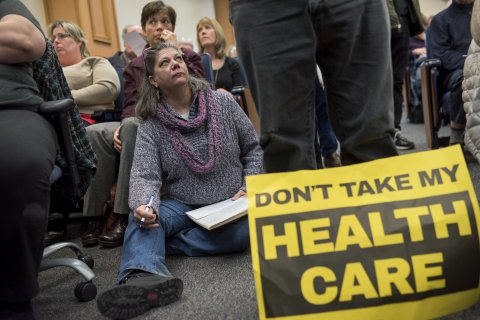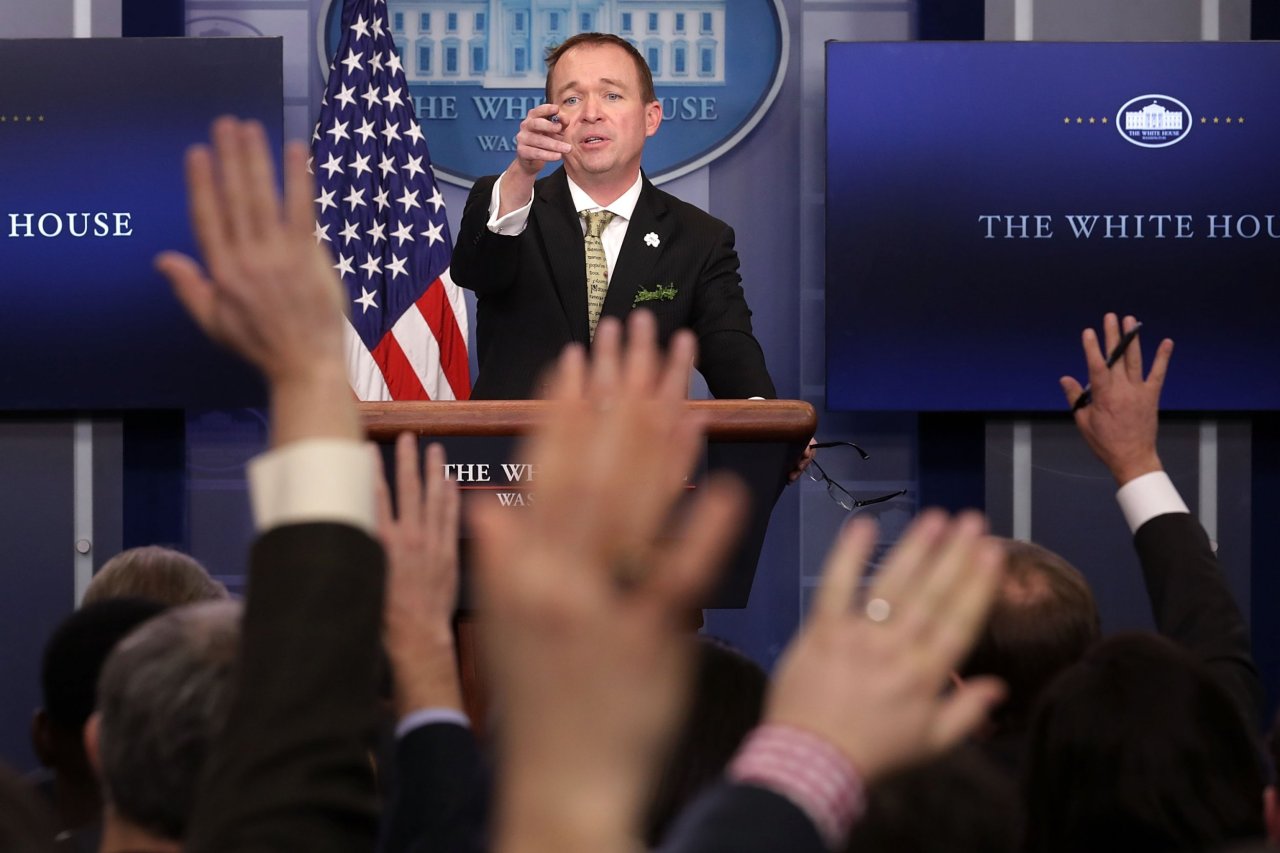The three most boring words in the English language might be congressional, budget and office, although some have argued for the phrase "worthwhile Canadian initiative." Despite its somnolent name, the Congressional Budget Office is in the middle of a rancorous debate over President Donald Trump's attempt to repeal and replace Obamacare. The CBO, an independent, bipartisan arm of Congress filled with economists and other wonks, analyzes legislation, estimating how much a law might cost the federal government and the people affected by it.
In the case of the American Health Care Act, or "Trumpcare" as some are now calling it, the CBO came to some stunning conclusions. Far from fulfilling Trump's promise to cover everyone—and at less of a cost—it found that 24 million more Americans would be uninsured by 2026 than if the country had stuck with Obamacare. Prices would soar for older Americans, who would lose subsidies provided under the current system, along with protections limiting what insurers could charge them before they become eligible for Medicare at age 65.
The CBO does dole out some praise for the plan. Premiums for some Americans, especially people in their 20s, would decline. Another upside: The federal government would end up saving $337 billion over the next nine years.
The Trump administration didn't wait for the report to start attacking the CBO. Mick Mulvaney, for example, was a U.S. representative from South Carolina until earlier this month, when he was confirmed by the Senate as Trump's director of the Office of Management and Budget. In Congress, Mulvaney was a leading conservative backbencher, a member of the Tea Party and the Freedom Caucus who often criticized Speaker of the House Paul Ryan for being insufficiently hard-line. But as OMB director, Mulvaney heaped praise on the Trumpcare bill, which Ryan's championing. He's also pushed back against some of his conservative allies who oppose the plan, but he saved his disdain for the CBO, saying, "Sometimes, we ask them to do stuff they're not capable of doing."
It was a sly Trumpian slight but also absurd, since assessing bills is precisely what the CBO was designed to do. If Mulvaney's dis wasn't clear enough, he appeared on a few morning TV shows, with a frigid and snow-covered Washington behind him, and mockingly proclaimed, "Welcome to Washington, where the CBO says it's 75 degrees and sunny."
This kind of back-and-forth might be dismissed as Washington gamesmanship, but it's important for two reasons. First, the fight over these numbers will determine what happens to many Americans and their health care. A debate that began over highly technical projections of insurance rates will reverberate in doctor's offices and emergency rooms. Another reason it matters: The CBO is one of many nonpartisan groups Trump has denounced as "dishonest," "unfair" or, in the case of the press, the "enemy of the American people. "
All presidents criticize the media and clash with their intelligence agencies. Thomas Jefferson chirped that "nothing" could be believed in a newspaper, and John F. Kennedy was apoplectic about the CIA after the Bay of Pigs fiasco. But those were exceptional outbursts. The man from Monticello also praised the press, and Kennedy grew close to the Langley spies.
Trump's rhetoric is beyond anything we've seen in this country; it's a scorched-earth tactic that damages both his targets and his credibility. When a federal judge struck down his travel ban on people from several Muslim-majority countries, the president decried the 9th U.S. Circuit Court of Appeals as "the most dishonest group of people ever." Later, he offered the now-disproven claim that President Barack Obama ordered a wiretap on Trump Tower, impugning both the former president and the FBI. What's going to happen if he has to convince the world Iran is cheating on the nuclear deal?
In 1974, Congress created the CBO to avoid such a credibility gap, just a month before President Richard Nixon resigned over the Watergate scandal. In an entirely unrelated battle, the president had squared off against Congress over the Clean Water Act of 1972, which lawmakers passed by overriding his veto. Nixon refused to spend the funds—impounding them, as it's called—which led to a fight that went all the way to the Supreme Court. To prevent future similar crises, Congress passed the Budget Act of 1974, which gave it much greater control over federal spending. It created the CBO so lawmakers could have an economic team to compete with the White House's much larger OMB. No longer would the legislative branch have to rely on the executive branch's economic assessment of the effects that legislation might have.

In the 43 years since, the CBO has become a widely respected institution. Its director is appointed by congressional leaders, sometimes Democrats, sometimes Republicans. A few of the most distinguished economists in Washington have run it, including Alice Rivlin, a Democrat, its first director and later an acclaimed head of the OMB, as well as Douglas Holtz-Eakin, arguably the top Republican economist in the capital today.
To be fair, presidents and even members of Congress have ripped into the CBO before. June O'Neill, who ran the office in the 1990s under House Speaker Newt Gingrich, used to get chewed out regularly by Gingrich, whose wrath was made worse by the giant model T. rex head in his office. "I have a folder of all the times he threatened to fire me, but he never did and was usually very gracious," says O'Neill, whom I worked for in the 1980s. Obama and Bill Clinton both took issue with the way the CBO scored their respective health care plans. But no one in the White House ever questioned whether the CBO was "capable" of scoring bills, as Mulvaney did.
What the CBO surmised about the Trump health care plan will set the parameters for the debate over the coming months. That's true even though the bill which will be voted on in the House on Thursday is undergoing a rewrite, since the measure has been attacked by all Democrats and big chunks of the GOP. (Conservative Republicans feel it too closely resembles Obamacare, while Democrats and moderate Republicans worry about poorer Americans losing their coverage under the plan.)
The CBO's trenchant analysis gets at the basic problem of health care under America's uniquely crazy quilt of public money and private insurance. The Republican plan set out to do a few things: lower insurance premiums, provide more choice to consumers and keep if not expand insurance coverage with much less regulation and federal spending. But the CBO report essentially says the GOP has failed. By dramatically scaling back the expansion of Medicaid—an integral part of Obamacare—it left millions of people unable to afford health care, the report shows. The Republican plan offers tax credits based on age to help people buy insurance, but that's not nearly enough, the CBO found, to compensate for the Medicaid cuts and the easing of regulations that limited what insurers could charge older Americans. The result: A typical 64-year-old would pay an astounding $13,000 more each year on health insurance in 2026 under the GOP plan than he would under Obamacare. Amendment that will be voted on by the House will ease the burden on older Americans but it won't fill the gap.
Younger Americans do better. Under the Republican plan, they'd no longer be required to buy insurance, and if they buy it, they can get the kind of catastrophe-only, high-deductible plans Obamacare prohibited. By 2026, a typical 21-year-old would be paying much less for insurance, on average. When you throw in other elements of the Republican plan—eliminating the mandate for larger employers to provide health insurance, scrapping the surtaxes on the rich that helped pay for Obamacare and so on, you get this: The wealthy get a huge tax break, younger people make out better, older Americans pay more, and the lower middle class gets screwed.
Estimating health care costs isn't an exact science, of course, and there are unanswered questions about the ramifications of the GOP's plan. Do insurers leave certain markets? Do young people flee the system after Congress repeals the individual mandate? The CBO doesn't know for sure. But its record on the Affordable Care Act was strong, according to a report from the Commonwealth Fund, a nonpartisan think tank. And it's still the best oddsmaker in Washington for this kind of game.
All health care plans create winners and losers, and if the CBO is right, Trumpcare's losers will include many of the president's voters. Rather than trying to significantly change its plan, the White House seems content to bully the math nerds on D Street. But when Grandma goes nuts because her premiums explode, the nerds may have their revenge.


















